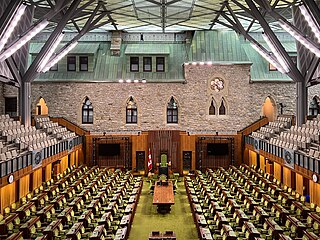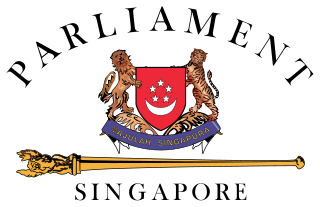
Cloture, closure or, informally, a guillotine, is a motion or process in parliamentary procedure aimed at bringing debate to a quick end.

The House of Commons of Canada is the lower house of the Parliament of Canada. Together with the Crown and the Senate of Canada, they comprise the bicameral legislature of Canada.

In parliamentary procedure, a point of order occurs when someone draws attention to a rules violation in a meeting of a deliberative assembly.
A question time in a parliament occurs when members of the parliament ask questions of government ministers, which they are obliged to answer. It usually occurs daily while parliament is sitting, though it can be cancelled in exceptional circumstances. Question time originated in the Westminster system of the United Kingdom, and occurs in other countries, mostly Commonwealth countries, who use the system.

Hansard is the transcripts of parliamentary debates in Britain and many Commonwealth countries. It is named after Thomas Curson Hansard (1776–1833), a London printer and publisher, who was the first official printer to the Parliament at Westminster.
An act of parliament, as a form of primary legislation, is a text of law passed by the legislative body of a jurisdiction. In most countries with a parliamentary system of government, acts of parliament begin as a bill, which the legislature votes on. Depending on the structure of government, this text may then be subject to assent or approval from the executive branch.
A private member's bill is a bill introduced into a legislature by a legislator who is not acting on behalf of the executive branch. The designation "private member's bill" is used in most Westminster system jurisdictions, in which a "private member" is any member of parliament (MP) who is not a member of the cabinet (executive). Other labels may be used for the concept in other parliamentary systems; for example, the label member's bill is used in the Scottish Parliament and the New Zealand Parliament, the term private senator's bill is used in the Australian Senate, and the term public bill is used in the Senate of Canada. In legislatures where the executive does not have the right of initiative, such as the United States Congress, the concept does not arise since bills are always introduced by legislators.
The Intelligence and Security Committee of Parliament (ISC) is a statutory joint committee of the Parliament of the United Kingdom, appointed to oversee the work of the UK intelligence community.

The Lok Sabha, also known as the House of the People, is the lower house of India's bicameral Parliament, with the upper house being the Rajya Sabha. Members of the Lok Sabha are elected by an adult universal suffrage and a first-past-the-post system to represent their respective constituencies, and they hold their seats for five years or until the body is dissolved by the president on the advice of the council of ministers. The house meets in the Lok Sabha Chambers of the Parliament House, New Delhi.

The House of Representatives is the sole chamber of the New Zealand Parliament. The House passes laws, provides ministers to form the Cabinet, and supervises the work of government. It is also responsible for adopting the state's budgets and approving the state's accounts.

The Legislative Assembly of Ontario is the legislative chamber of the Canadian province of Ontario. Its elected members are known as Members of Provincial Parliament (MPPs). Bills passed by the Legislative Assembly are given royal assent by the lieutenant governor of Ontario to become law. Together, the Legislative Assembly and Lieutenant Governor make up the unicameral Legislature of Ontario. The assembly meets at the Ontario Legislative Building at Queen's Park in the provincial capital of Toronto.
Parliamentary privilege is a legal immunity enjoyed by members of certain legislatures, in which legislators are granted protection against civil or criminal liability for actions done or statements made in the course of their legislative duties. It is common in countries whose constitutions are based on the Westminster system.

The Parliament of Singapore is the unicameral legislature of the Republic of Singapore, which governs the country alongside the president of Singapore. Largely based upon the Westminster system, the Parliament is made up of Members of Parliament (MPs) who are elected, as well as Non-constituency Members of Parliament (NCMPs) and Nominated Members of Parliament (NMPs) who are appointed. Following the 2020 general election, 93 MPs and two NCMPs from three political parties were elected to the 14th Parliament. Throughout the sitting of Parliament, nine NMPs are usually appointed by the president on a biennial basis.
In US parliamentary procedure, the previous question is generally used as a motion to end debate on a pending proposal and bring it to an immediate vote. The meaning of this specialized motion has nothing to do with any question previously considered by the assembly.
A committee of the whole is a meeting of a legislative or deliberative assembly using procedural rules that are based on those of a committee, except that in this case the committee includes all members of the assembly. As with other (standing) committees, the activities of a committee of the whole are limited to considering and making recommendations on matters that the assembly has referred to it; it cannot take up other matters or vote directly on the assembly's business. The purpose of a committee of the whole is to relax the usual limits on debate, allowing a more open exchange of views without the urgency of a final vote. Debates in a committee of the whole may be recorded but are often excluded from the assembly's minutes. After debating, the committee submits its conclusions to the assembly and business continues according to the normal rules.
In countries with a parliamentary system of government, contempt of parliament is the offence of obstructing the legislature in the carrying out of its functions, or in the hindering any legislator in the performance of their duties.
In parliamentary procedure, a motion is a formal proposal by a member of a deliberative assembly that the assembly take a particular action. These may include legislative motions, budgetary motions, supplementary budgetary motions, and petitionary motions.

An Act of Parliament in the United Kingdom is primary legislation passed by the UK Parliament in Westminster, London.
Naming is a procedure in some Westminster model parliaments that provides for the speaker to temporarily remove a member of parliament who is breaking the rules of conduct of the legislature. Historically, "naming" refers to the speaker's invocation of the process by calling out the actual name of the member, deliberately breaking the convention of calling on members by the name of their constituency.

Erskine May is a parliamentary authority originally written by British constitutional theorist and Clerk of the House of Commons, Thomas Erskine May.










